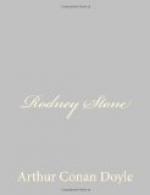“You know Berks, the bruiser?” asked my uncle.
“Yes, Sir Charles.”
“Has he passed?”
“Yes, Sir Charles. It may have been about four o’clock, though with this crowd of folk and carriages it’s hard to swear to it. There was him, and Red Ike, and Fighting Yussef the Jew, and another, with a good bit of blood betwixt the shafts. They’d been driving her hard, too, for she was all in a lather.”
“That’s ugly, nephew,” said my uncle, when we were flying onwards towards Reigate. “If they drove so hard, it looks as though they wished to get early to work.”
“Jim and Belcher would surely be a match for the four of them,” I suggested.
“If Belcher were with him I should have no fear. But you cannot tell what diablerie they may be up to. Let us only find him safe and sound, and I’ll never lose sight of him until I see him in the ring. We’ll sit up on guard with our pistols, nephew, and I only trust that these villains may be indiscreet enough to attempt it. But they must have been very sure of success before they put the odds up to such a figure, and it is that which alarms me.”
“But surely they have nothing to win by such villainy, sir? If they were to hurt Jim Harrison the battle could not be fought, and the bets would not be decided.”
“So it would be in an ordinary prize-battle, nephew; and it is fortunate that it should be so, or the rascals who infest the ring would soon make all sport impossible. But here it is different. On the terms of the wager I lose unless I can produce a man, within the prescribed ages, who can beat Crab Wilson. You must remember that I have never named my man. C’est dommage, but so it is! We know who it is and so do our opponents, but the referees and stakeholder would take no notice of that. If we complain that Jim Harrison has been crippled, they would answer that they have no official knowledge that Jim Harrison was our nominee. It’s play or pay, and the villains are taking advantage of it.”
My uncle’s fears as to our being blocked upon the road were only too well founded, for after we passed Reigate there was such a procession of every sort of vehicle, that I believe for the whole eight miles there was not a horse whose nose was further than a few feet from the back of the curricle or barouche in front. Every road leading from London, as well as those from Guildford in the west and Tunbridge in the east, had contributed their stream of four-in-hands, gigs, and mounted sportsmen, until the whole broad Brighton highway was choked from ditch to ditch with a laughing, singing, shouting throng, all flowing in the same direction. No man who looked upon that motley crowd could deny that, for good or evil, the love of the ring was confined to no class, but was a national peculiarity, deeply seated in the English nature, and a common heritage of the young aristocrat in his drag and of the rough costers sitting six deep




